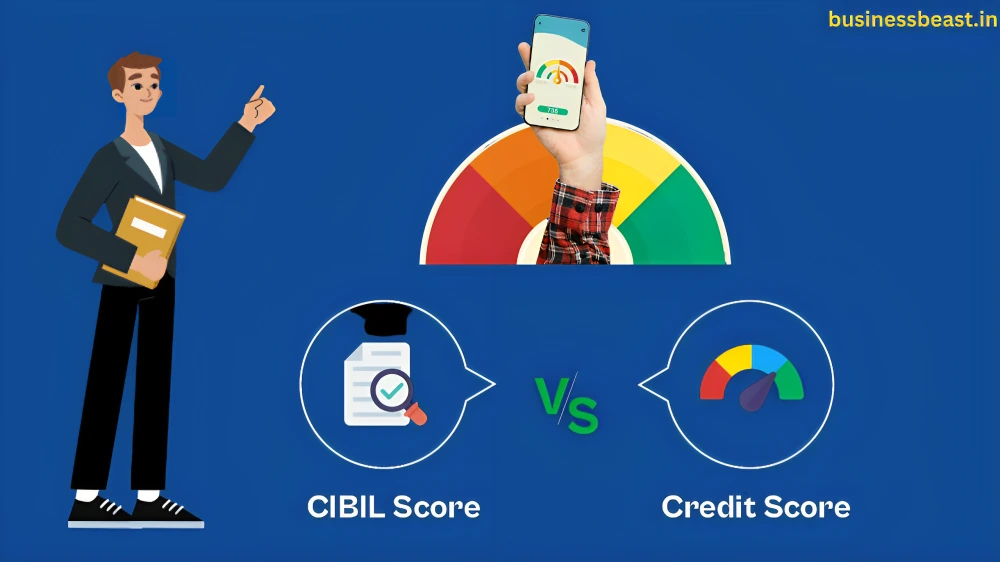Creditworthiness is a critical element that might affect your eligibility for loans, credit cards, and other financial opportunities in the realm of personal finance and lending. Credit score and CIBIL score are two words that are frequently used in this context. Although they can appear to be the same thing, there are small differences between the Credit Score vs CIBIL Score.
This article will examine the definitions, sources, considerations, usage, accessibility, and applications of credit scores vs CIBIL scores, illuminating their significance and highlighting differences between the Credit Score vs CIBIL Score.
What is CIBIL?
The first credit information company in the country is called CIBIL, or Credit Information Bureau (India) Limited. To create credit reports and scores for individuals and businesses, it collects data on credit from banks and other financial institutions.
CIBIL is currently referred to as TransUnion CIBIL after being purchased by TransUnion, a well-known supplier of identity management and credit services. Lenders use the credit data kept by CIBIL to assess a borrower’s creditworthiness before giving credit to them. Your credit score and credit report, both of which are provided by CIBIL, determine whether you are eligible for a loan, credit card, or any other sort of credit.
Read also: Paytm Personal Loan
What is the CIBIL Score?
One of India’s four credit bureaus, The Credit Information Bureau (India) Limited (CIBIL), goes by the name ‘CIBIL’ and provides credit scores. A person’s credit history and creditworthiness are indicated by this three-digit number.
The ‘Accounts’ and ‘Enquiries’ sections of a person’s credit information report reflect their credit activity, which is what determines their CIBIL Score. The score ranges from 300 to 900, with a score of at least 700 typically being considered to be good. Lenders and financial organizations primarily consider a person’s Credit Score vs CIBIL Score when deciding whether to grant them loans, credit cards, and other financial goods.
Difference Between The Credit Score vs CIBIL Score
The following table will help you understand the distinction between a Credit Score vs CIBIL Score:
| Criteria | CIBIL Score | Credit Score |
| Definition | The Credit Information Bureau (India) Limited (CIBIL) provides a credit score to determine a person’s creditworthiness. | A borrower’s creditworthiness is quantified using a number of factors, such as the length of their credit history, their payment history, their credit history, and how much credit they are currently utilizing. |
| Calculation | based on the credit report on a specific person that various credit institutions have provided to CIBIL. | Credit scores are calculated by taking into consideration a number of factors, such as payment history, credit use, credit mix, duration of credit history, and new credit accounts. |
| Range | Ranges from 300 to 900 | Ranges from 300 to 850 or 900, depending on the credit bureau |
| Credit Bureau | It is one of India’s four credit bureaus, along with Equifax, Experian, and CRIF High Mark. | Experian, Equifax, TransUnion, and other credit bureaus are only a few of the numerous ones that exist worldwide. |
| Authority | A licensed credit bureau under Reserve Bank of India regulation is CIBIL. | Credit bureaus are regulated by various authorities in different countries. |
What Information is Available in the CIBIL Report?
The CIBIL report is divided into the following six sections:
Credit score: The ‘Accounts’ and ‘Enquiries’ portions of your CIBIL report represent your credit activity, which is used by CIBIL to determine your credit score. Your CIBIL score can be anywhere between 300 and 900, and a score of at least 700 is generally regarded as good.
Personal details: Your personal details, such as your name, date of birth, gender, PAN number, voter ID, etc., are reported under this section.
Contact details: This section lists the phone numbers and addresses you can reach you at. Depending on the data gathered from various financial institutions, it can report several numbers and addresses.
Employment details: This section displays your monthly income as reported by banks or other financial institutions.
Account details: The Credit Score vs CIBIL Score facilities you have used are listed in detail in this section. Names of lenders, categories of credit facilities (such as home loans, vehicle loans, personal loans, overdrafts, etc.), account numbers, ownership information, dates of opening and most recent payments, loan amounts, current balances, and a record of your payments month by month for up to three years are all included in this information.
Inquiry details: This section lists how many times banks or other financial institutions have checked your credit report.
What is the Credit Score?
A credit score vs Cibil Score, which consists of three digits and measures a person’s creditworthiness, is dependent on a number of factors, such as credit history, payment history, credit use, and length of credit history.
It helps financial institutions and lenders determine a person’s likelihood of timely debt payback. There are Credit Score vs CIBIL Score ranging from 300 to 900. An improved credit score can result in better conditions for loans, credit cards, and other financial goods because it normally indicates a lower credit risk.
Credit Score vs CIBIL Score
| Aspect | Documents | Eligibility |
| Definition | An estimate of a borrower’s or loan applicant’s creditworthiness expressed numerically. | a credit rating created especially for the Indian market, where borrowers are evaluated and scored according to specific parameters. |
| Source | Varies by country; FICO scores are common. | Generated by TransUnion CIBIL in India. |
| Factors Considered | Payment history, credit usage, length of credit history, different types of credit, recent credit inquiries, etc. | The same variables but applied to financial data specific to India. |
| Usage | widely used, with regional and lender variations. | Financial institutions primarily use it in India. |
| Accessibility | accessible via financial institutions or credit bureaus. | accessible via the TransUnion CIBIL website or Indian financial institutions. |
| Applications | used for approving loan applications, credit card applications, rental applications, and more. | In India, this method is primarily used for credit card and loan approvals. |
| Comprehensive Picture | gives an overall picture of a person’s creditworthiness. | provides information about a person’s creditworthiness in the context of India. |
Conclusion
The same basic function of determining a person’s creditworthiness is carried out by both credit score vs CIBIL score. They may employ somewhat different algorithms and data sources, but they are still suited to distinct geographical areas.
knowing the difference between credit score vs CIBIL score is important, especially if you plan to apply for credit cards or loans in a certain nation. Having a solid credit history is still necessary for accessing financial possibilities, regardless of the scoring methodology.








Leave a Comment